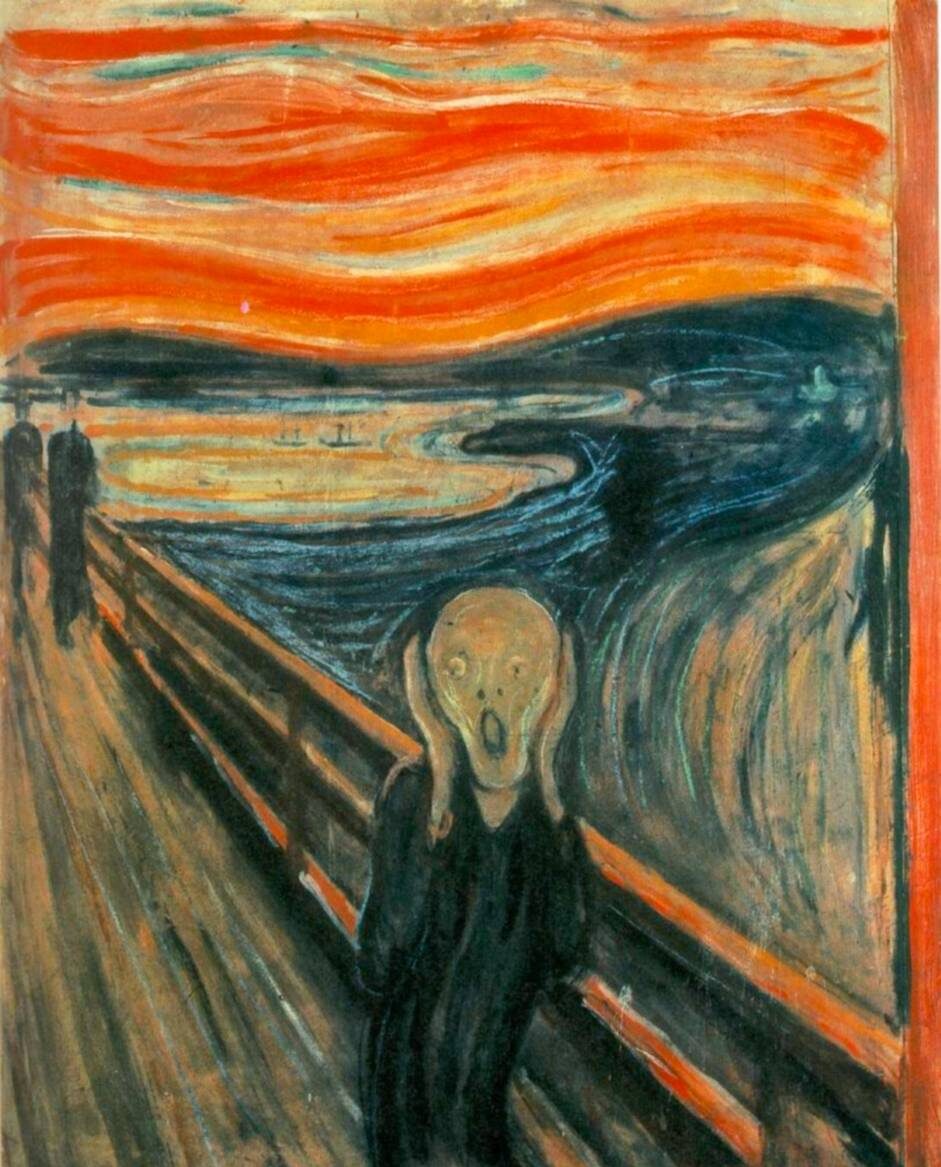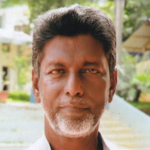TRANSLATED FROM THE MALAYALAM BY K.M. AJIR KUTTY

Image Used For Representation
There was a railway station somewhere. The station existed as though it was on an alien planet, emitting the desolateness of a desert and the hot wind of loneliness. Masses of rain clouds and rare birds passed that way with fear writ large on their faces. The rail tracks passing by the station stretched into another inscrutable sphere after having had their origin from some mysterious source. More often than not they were white with extreme heat. In the midst of the mounds of road metal it lays dazed like a venomous snake. When wind blew through the telephone wires, both the desolateness and the loneliness jointly produced a deathlike buzz.
It was a young man afflicted with premature old age who was the master at the station. With its pillars built in consonance with British architecture and its ancient looking roof, the station reminded one of a house of the dead.
The station master who found himself in an ocean of loneliness kept writing letters to his superior officers.
Respected Sir,
I do not know what number of petition this is that is being preferred now. Nor do I know the number of years that I have been on the job at this station. As it has come to pass, I have lost my past as well. I have watched umpteen times leaves falling in abundance at a distance in autumn winds. In fact, wasn’t it as someone sentenced to solitary confinement for life that I was appointed to this position, Sir? Would you please see to it that that truth at least is not kept hidden from me, Sir? When someone is destined to be lonely for a long time, or when someone keeps thinking about himself all the while, he will be ostracised or even exiled; he will be sunk into the swamp of forgetfulness. I have already sunk into it from foot to middle of the body. That this is my past is the cruel truth, actually. And the remaining half is my future, if not, what else? And the zany rail tracks passing before my delirious days and nights caught in this vortex. The solitary trains screeching along them intermittently at lightning speed failing the discerning eyes that follow them in vain; and the deafening chug chug of them. I have often felt why I am waving this green flag, Sir. Will you please let me know whether there is anybody who actually takes note of this green flag, at least?
When he has finished writing so much, he lost his concentration. Is a booming sound being heard from the distance? That of a train? A passenger train? Or a goods train?
It has always suffocated him like love not exchanged. In fact, the only link that the master had with life in the world at large was Saappaatti. Saappaatti means servant whose physical features were nearly human, so to speak. I do not know how suitable the word servant is here. Whenever the master was hungry, he would come with the same food prepared with the same ding dong of cooking and dishing out. Saappaatti’s repulsive organs and tribal eyes of abominable hoariness reminded one of a greedy fly flying over a blob of shit, droning. It was on Saappaatti that the master depended to send letters addressed to his superiors by registered post. He brings something as his monthly salary every month. The master used to think that even newspapers brought by him were bogus too.
The master would ask as usual:
“You didn’t register those letters, did you?”
“You could see the superiors and tell them about my plight, couldn’t you?”
“They could send a substitute in my place at least for a day; did you let them have my application?”
Saappaatti would listen to him lazily. Then he would be like a middleman between devil and man.
Seeing Saappaatti’s callousness and lethargic responses, the master would explode with rage quite often:
“What are you listening to? Do you hear what I say? Do you let my superiors know of my letters and complaints?”
He would look at the master with his vacant eyes; the very look that has haunted him for centuries now. With that the master would have trouble trying to subdue intense grief.
“I will go my way relinquishing this duty. Do you think that I am unable to do that?”
He would stand with the pupils of his eyes gone invisible.
A repeat of the same scene took place on that day also.
He remembered that he was more provoked than ever that day and the fact that he was panting was a sign of his aging.
He knew that some virtue was gnawing at him as though it were an unavoidable punishment. He knew also that he had only one service to be put to use at the station. No accident should occur due to my negligence. No two trains should run along the same track at the same time. No infants should scream aloud. There should not be any mothers who have lost their children; nor be there any widows. He heard the clank of the chains of rigorous imprisonment being lifted. Can I not go out into the open leaving this station behind? Just then quite unexpectedly a train screeched past the station sending shudders through him. Within no time he went into the station, took the flag and waved it at it. Am I the satisfaction that has done its duty or absurdity personified? This thought assailed him for hours whenever a train chugged past the station.
At the end of which he would write to his superior officers. Tied down with pain and mental agony, he even forgot the official language and style generally used in petitions addressed to governments. With much effort and composure he kept himself from plummeting to the level of a wailing elegy.
Once he wrote in his petition:
Why are the telephone wires passing this way, Sir? Was it the ruffian of a ruler, who never bothers to have a verbal exchange, who fastened them tight like this?
Would he be not able to muster the courage needed to get out of the station ever? One could not say that he had not made any attempt ever. He had done it; only once. Listening intently to the reverberations of the sound of the passing trains heard on the tracks, he tried walking along them for a few yards. It was on a misty morning that he did it.
He saw –
The ghostly apparitions of telephone poles all along. Birds in fright were flying away from the solitary tree as though they had seen something ominous. He felt that each step he took distancing himself from the station was a step towards utter irresponsibility. With the sense of duty and oppressive authority hanging heavy in him, his heartbeat increased by degrees even as his sense of guilt became harder and more impuissant. Mist had further gathered in the inscrutable distances. Did a tiny grain of sound fall to the earth from the tracks stretching up endlessly? O God, this railway station, my orphaned railway station! Developing cold feet, he ran back, took the flag and stood ready to wave it at any time.
Meanwhile, Saappaatti came to see him a number of times. He had not washed out the face of the devil. In order to survive the loneliness, the master stuffed his rest room with tall mirrors and ornamental objects and cosmetics. He stuck the picture of a crowd of people milling around on the wall. He tried to overcome loneliness. When he was bored to the hilt, he would spend a lot of time looking at his own image in the mirror, making faces at it after ensuring that nobody was watching him. When he began to be fed up with that, he started dancing in front of the mirror. It was in the belief that the person who danced was not himself but someone else that he went on dancing before the mirror. Gradually, this too bored him as an absurdity.
It was not long before he threw out the cosmetics and ornaments. In all consumer products the master smelt the presence of some unknown corpse. Still again, he began to be assailed by that railway station smelling of primitiveness, endless wait for trains, loneliness and hot winds.
Two
In the years gone by, he had never been denied any information regarding a coming train. Not even a single train has passed his station without the master waving the flag at it. He was ageing. And on his part he kept petitioning his superior officers. Even the date on which he was appointed, the examinations that he had taken, and the training he was given too were buried in the cemetery of his memories. As things were moving on thus, on a day which marked the end of the season of autumn, it occurred to the master thus: won’t there be a person like me at either end of these tracks? There must be. If I am to walk straight along the tracks, I will certainly be able to meet one of them. But, I am not inclined to abandon the station, anyhow. In the time I absent myself from the station, I apprehend the chance of a train running past my station! An irresponsible official is just a moving corpse. And he will be a criminal cut out for it, too.
Suddenly an idea occurred to him:
Hundreds of thousands of trains made of steel have passed this way through oblivion stretching over years and years. Not even once had he seen anybody piloting the locomotive. Not even a single person had greeted him. They were just passing like some hearse or a vehicle for dead bodies all through the days and midnights. His existence has never received any greetings in return from them. Therefore, he stuffed his uniform with fodder and made it into a scarecrow. It was made to stand holding a green flag in hand at the station, bending a little over the tracks. He had concealed everything from Saappaatti. He is the spy of some underworld ruler.
When he saw that everything was in place and okay, he started to walk away from the station. Each step he took fell heavily as an unbearable burden on the earth. Wind blew through the telephone wires which were fastened tight on the poles posing as the abode of ghosts. Hearing their buzz, the master, for the first time in his life, did not feel frightened at all. He felt as if he were being born anew into a new earth even as he stepped away from the station, gradually. It was not known why the birds this time did not fly away frightened from the solitary tree. They looked at him as though he was a virtuous man though utterly strange.
The master now recognised his station as a dot in the distance. It seemed to him that the parched lands on either side sported some gentle hue. The master came to know that the primitive odour which surrounded the station has started to fade from him. Did a bird sing in the distance? Did a wind daubed with some fragrant balm kiss me? As he progressively pressed ahead along the tracks, the master knew that his outing was acquiring some comfort and rhythm internally. The mystery that remains hidden as distances in this bleakness starts to liberate itself from his sight. Now, there was a turning on the tracks. The master was alarmed. It is all by themselves that the tracks take a turn. The tracks pull apart from each other to move further into the distances. O God, what were my trains and my standing eyewitness to them for a lifetime meant for?
The master could not but burst into tears.
Also, read Locating Postcolonial Hero in Bangla Speculative Fiction Part II by Debraj Moulick published in The Antonym
Locating Postcolonial Hero In Bangla Speculative Fiction Part II— Debraj Moulick
Follow The Antonym’s Facebook page and Instagram account for more content and interesting updates.



























0 Comments